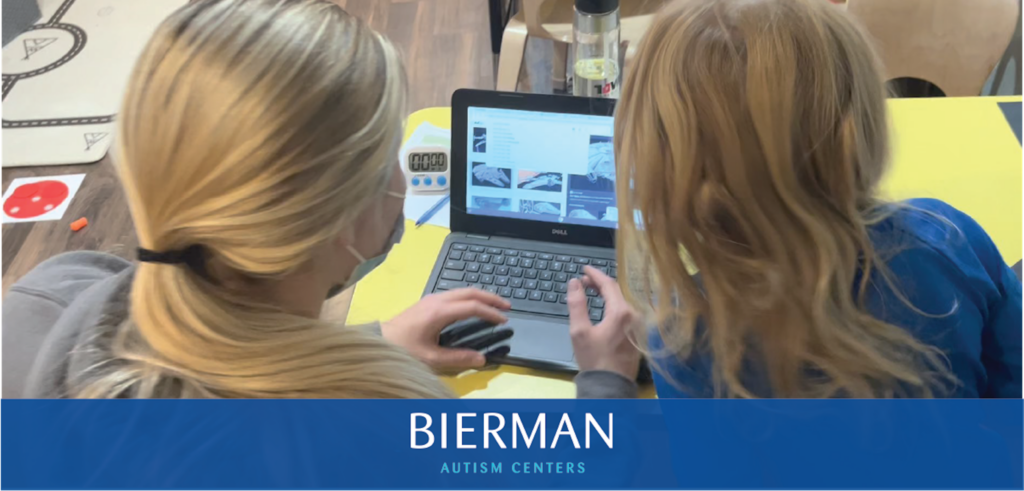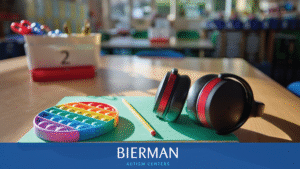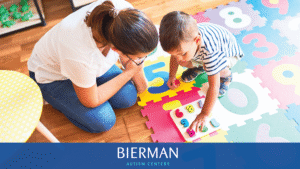Today we’re sharing an introduction to speech therapy. It might be tricky to understand exactly what it is, who does it, or how it might benefit your child.
Let’s break it down to give you some clarity!
Speech therapy assesses and treats communication, language, speech, cognitive, feeding, and swallowing disorders.
A Speech Language Pathologist (SLP) is a clinician that works to prevent, assess, diagnose, and treat the delays and disorders listed above.
At Bierman Autism Centers, speech-language pathologists address the assessment and treatment of speech, language, play, and feeding. We work in tandem with each child’s Behavior Therapist and BCBA. Our team knows that every child is different, and we aim to meet each child where they are and design treatment tailored to their individual needs.
Now, let’s discuss some areas that fall within the scope of practice for speech-language pathologists to help you determine if your child would benefit from speech therapy.
Expressive language refers to how we use language. Expressive language is commonly thought of as spoken or vocal-verbal language, but it refers to all communication modalities, including words, gestures, signs or symbols.
How do I know if my child/client needs support with their expressive language? Here are some questions to ask yourself regarding your child’s language:
- Does my child have a limited expressive vocabulary (less than 50 words)?
- Are they having difficulty conveying their wants, needs, and feelings effectively?
- Are they using spoken language?
- Do they have difficulty naming items?
- Do they combine words together using the correct word order?
- Do they use ‘jargon’ (made-up words) frequently?
- Do they produce sentences that are ‘muddled’ (i.e., words in the wrong order, lots of stops and starts, a lack of flow)?
- Are they difficult to understand? Are they understood by unfamiliar people?
- Do they have trouble recalling events and re-telling stories?
Receptive language refers to the ability to understand words and language. This includes comprehension of what is said by others and what is read.
How do I know if my child/client needs support with their receptive language? Here are some questions to ask yourself regarding your child’s language:
- Do they have difficulty attending to and listening to language?
- Do they have difficulty following directions?
- Do they answer questions appropriately?
- Do they respond by repeating what you say instead of giving an answer?
- Do they have a limited vocabulary (less than 50 words)?
- Do they not appear to understand basic concepts (e.g., on/off, up/down)?
- Do they have trouble comprehending what they read?
- Are they able to recall details from stories?
- Are they able to retell personal events and stories?
Pragmatic language refers to our ability to use appropriate communication in social situations. It includes knowing what to say, how, and when to say it. There are three main areas of focus: using language for different purposes, changing language according to the listener or situation, and following rules for conversation.
How do I know if my child/client needs support with their pragmatic language? Here are some questions to ask yourself regarding your child’s language:
- Is my child initiating communication?
- Is my child using eye contact and joint attention (shared attention) to engage in activities?
- Is my child only using language to request?
- Can they protest or reject unwanted items and activities? (e.g., I don’t like that.)
- Can they share or gain information? (“What is that?”)
- Can they direct the activities of others? (“You come here.”)
- Can they comment? (“That’s so fun!”)
- Does my child have difficulty initiating conversation and taking conversational turns?
- Do they have difficulty staying on topic?
- Does my child have difficulty understanding nonverbal language (e.g., facial expressions, body language)?
- Do they understand personal space?
Play Skills are an integral part of language development and social communication. Play is defined as the voluntary engagement of self-motivated activities that are normally associated with pleasure and enjoyment. Play is critically important in language development, and we will discuss this in future blogs!
For now, you can ask yourself the following questions to see if your child may need support in this area:
- Does my child have difficulty playing independently?
- Do they frequently move between activities without completing or actively engaging in them?
- Do they engage in limited or very repetitive activities?
- Do they require assistance from adults to problem solve?
- Is it difficult for them to engage in turn-taking games?
- Are they fixated on the television or iPad to the extent that they will not engage in anything else?
- Do they struggle to initiate play with others?
- Are they rigid with their play?
If your child is struggling with any areas of expressive, receptive, or pragmatic language, including play skills, they might benefit from speech therapy. A speech-language pathologist can assess these areas and work with you and your family to improve these skills. Now that we have reviewed areas that cover the “language” portion of speech and language therapy let’s talk about the speech portion!
A speech sound disorder refers to how we produce sounds and words and our overall intelligibility.
This includes the following:
- Articulation Disorders: motoric errors, including substitutes, distortions, and omissions in the production of individual speech sounds.
- An example will be if your child produces the “s” or “z” sound with a frontal or lateral lisp.
- Phonological disorders: occurs when a child struggles to understand the sound system and the rules surrounding speech.
- An example will be if your child tends to leave off final consonants in words (e.g., “pi” for “pig,” “ca” for “cat,” and “uh” for “up”).
- Childhood Apraxia of Speech: a neurological condition that affects the brain pathways involved in planning the sequence of movements involved in producing speech. In other words, the brain knows what it wants to say but cannot properly plan and sequence the required speech sound movements. This is not the result of reduced muscle strength.
- Dysarthria: speech disorder caused by reduced muscle strength in your lips, tongue, face, or throat.
A comprehensive speech assessment is necessary to determine your child’s speech sound disorder and guide your SLP in choosing the most appropriate intervention method!
Feeding and Swallowing Disorders are other areas of speech therapy that SLPs address. SLPs employ a team approach to address feeding and swallowing assessment and treatment. We work closely with related professionals, including occupational therapists, behavioral analysts, and medical professionals. Our approach includes the medical, behavioral, and oral-motor components of eating.
How do I know if my child/client needs therapy for feeding and swallowing? Here are some questions to ask yourself regarding your child’s feeding:
- Is my child gaining adequate weight?
- Does my child often have food or drinks fall or spill out of their mouth?
- Is my child a picky or selective eater?
- Do they appear to have difficulty with biting, chewing, or swallowing?
- Do they have a preference for specific textures?
- Do they spit or throw up frequently?
- Is there frequent coughing or gagging during mealtimes?
- Does my child have difficulty drinking from various cups or using straws?
Augmentative and Alternative Communication (AAC) is also an area in which SLPs provide assessment and treatment. AAC refers to ways of communicating without the use of spoken language if spoken language alone is ineffective. Types of AAC include visual supports, sign language, picture exchange communication systems (PECS), speech-generating devices (SGD), and writing.
How do I know if my child might benefit from an AAC evaluation? Here are some questions to ask yourself regarding your child’s language:
- Is my child completely nonverbal or minimally verbal?
- Is their speech difficult to understand?
- Do they have a vocabulary of fewer than 50 words?
- Do they use a high level of scripted phrases?
Common myths about AAC
- It will stop my child from speaking
- Children have to be “ready” for a device
- AAC should be used as a last resort
- My child has words, so they don’t need AAC
These are myths, and they are NOT true. In a follow-up blog post, we will provide more information to debunk these myths and explain how beneficial AAC can actually be. We will also discuss how to access and implement AAC to help your child improve their language and communication skills in the home, academic and community setting!
At Bierman ABA Autism Center, there are SLPs available to assist you and your child. In some locations, SLPs are available for direct services. If your location does not have an SLP at its center, don’t worry – we can still help your child through our consultation model. Our goal is to work as part of a multidisciplinary team with BCBAs and OTs to ensure your child’s speech and language needs are met.
SOURCES
https://www.nidcd.nih.gov/health/apraxia-speech
https://www.asha.org/practice-portal/clinical-topics/articulation-and-phonology/
https://childdevelopment.com.au/areas-of-concern/play-and-social-skills/play-skills/
https://www.amyspeechlanguagetherapy.com/articulation-vs-phonological.html
Author: Valerie Luby, SLP


